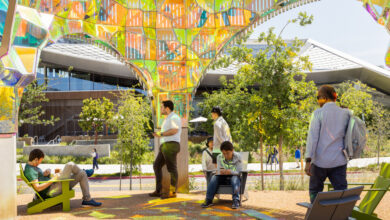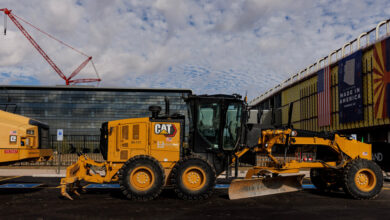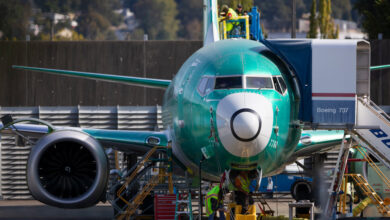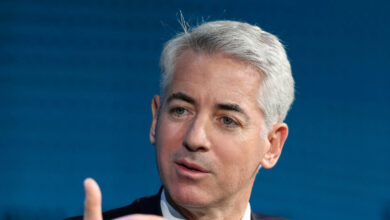Bacon, Banter and the Business of a Diner
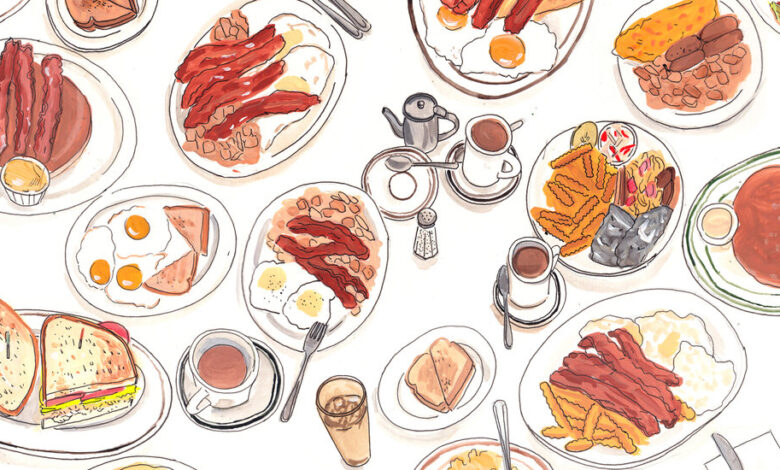
SCRATCH
“I try to make people feel good.” How one New Jersey diner keeps the doors open.
Julia Rothman and
Julia is an illustrator. Shaina is a writer and filmmaker.
Just after 5 a.m. on a recent Friday, Bendix Diner, a small, family-run business, began frying up eggs on the griddle to make the first of dozens of dishes it would serve to a steadily rotating cast of regulars.
From daybreak through lunch, 46 customers ate over 87 eggs and 36 strips of bacon, and drank gallons of coffee. This classic diner in Hasbrouck Heights, N.J., just 15 miles from Manhattan, offered a glimpse into so many things gripping the country right now.
Above the din of cooking and a TV blasting a courtroom show, we could hear people bemoaning the rising cost of gas and goods. Some debated who should be the next president, while others discussed marijuana laws.
The one constant was the sense of community that diners found in the place — and its owner, John Diakakis, a 56-year-old blind man whose family has owned the restaurant since 1985, (though it has been around since the 1940s).
Despite not being able to see, Mr. Diakakis zips around — delivering food, refilling drinks, handling money. He is helped by a small team: his three sons, who pitch in on weekends; a longtime cook, Julio; and a part-time dishwasher who is known as Tiny (though he is well over six feet tall).
The regulars — mostly men, many of whom also have nicknames — give Mr. Diakakis a heads-up on who’s coming in and bring customers’ dirty dishes into the kitchen.
“This place makes a decent living. But, it’s laborious work to run a diner,” Mr. Diakakis said.
Running a small business like Bendix has always been precarious. Weekdays are hit or miss, he said. Weekends are hectic (the diner regularly goes through 1,000 eggs). But it’s become even tougher in the last couple of years as rapid inflation has made operating costs unpredictable.
“After Covid, there’s been a lot of shifting. Week by week it’s different. Up until recently, a case of eggs had doubled, and when there’s news about the bird flu, a case will be as much as four times the cost.” As we kept track of every meal ordered that morning, Mr. Diakakis talked to us about what was on the menu.
New Jersey has long embraced its reputation as the country’s diner capital. Peter Sedereas, who owns a diner in New Jersey and runs an unofficial diner coalition, said that the number of diners in the state has fallen in recent years. “We don’t officially keep track; it’s more word of mouth. At its peak we had 575 diners, and we have about 400 now.”
The Diakakises have hustled to adapt: updating their menu with vegetarian options and opening their doors to movie shoots for extra income. “This summer I’m going to try DoorDash and Uber Eats. I’ve got to make sure I stay above the deck,” Mr. Diakakis said. “Things change. You’ve got to evolve.”
While Bendix continues to adapt, its enduring appeal is the nostalgia it fosters.
But the customers here also like to talk about what’s current, in a country that feels embattled. The regulars come from all walks of life and across party lines. “The Fox News and the CNN parrots will argue amongst themselves at the counter. I try to stay nonpolitical,” Mr. Diakakis said.
Customers like Khaled Mohamed, 49, a professor and aircraft engineer, are feeling economic pressures of their own.
Walter Martin, 59, owns a limousine service. He’s known as Limo Walt. He first stepped into Bendix 13 years ago.
These days, a place like Bendix is being squeezed on multiple sides — by high ingredient costs, spiking property taxes and competition from food delivery apps that have become a fixture of daily life. A restaurant has to offer something special to lure diners out of the house.
For Dominique Cebollero, 30, a police officer, and her mom, Mary, 70, it’s the atmosphere at Bendix that does it.
Ultimately, this is Mr. Diakakis’s — ahem — special sauce. He fosters community and creates an environment where people take care of one another. In a world that often feels cruel, Bendix Diner is the opposite.
“It’s been almost two and a half years since I’ve increased the price of food,” Mr. Diakakis said. “I’m not afraid of charging a little bit more, because I try to make people feel good. They laugh, have some food, experience the blind guy.”
“They’re not walking out of here like, ‘Why the hell did I walk in?’ ”
